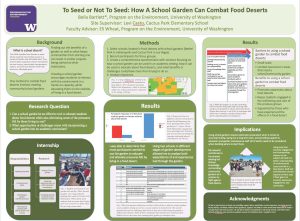← Back to all capstone projects
To Seed or Not To Seed: How A Community Garden Can Combat Food Deserts
Food deserts are a rising epidemic affecting the United States. Due to the reality of living in a food desert, consequences such as food insecurity and increased health problems are experienced by already vulnerable groups, as food deserts disproportionality affect low-income and minority households. One approach to combating food deserts includes the implementation of community gardens. My project with Cactus Park Elementary School, seeks to establish a school garden. I analyzed what the community stands to gain from the school garden, and how the garden can expand on a student’s comprehension of food deserts and the environment. My methodology for this project involved hosting focus groups at two schools located in food deserts. My analysis of participants answers and consideration of the stage each garden is in, revealed a positive response to using the garden as an academic tool both to educate about food deserts and general environmental knowledge. Additionally, there is increased engagement from students in activities involving the school garden promoting learning while providing a connection to green space in an increasingly urbanized area. Lastly, gardens produce food on a small yet accessible scale. Introducing fresh produce into a community that has historically been deprived of it. My findings show that community gardens are an engaging tool to help a community mitigate the effects of a food desert and corroborates outside researchers’ conclusions that school gardens should be utilized in an academic setting.
https://youtu.be/TDLIF1djoQY
